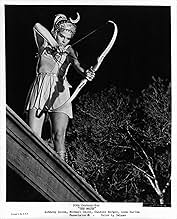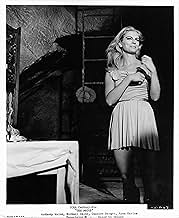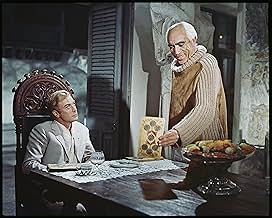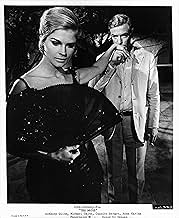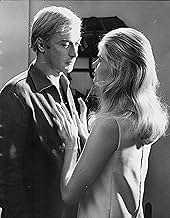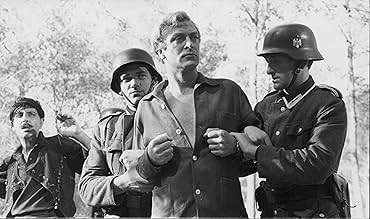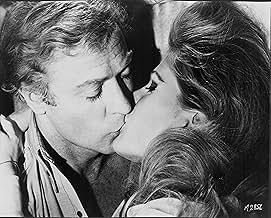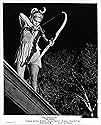Un maestro de una isla griega se envuelve en extraños juegos mentales con el mago de la isla y una hermosa joven.Un maestro de una isla griega se envuelve en extraños juegos mentales con el mago de la isla y una hermosa joven.Un maestro de una isla griega se envuelve en extraños juegos mentales con el mago de la isla y una hermosa joven.
- Nominada a1 premio BAFTA
- 1 nominación en total
Danièle Noël
- Soula
- (as Danielle Noel)
Andreas Malandrinos
- Goatherd
- (as Andreas Melandrinos)
Opiniones destacadas
I've read the Fowles novels-- including the original and the "new, improved" versions of The Magus (BTW the "new, improved" version was a bad move John, you should have left the damn book alone with its ambiguities intact), so it ain't like I are illiterate or somethin'...
Seems to me a lot of people expect a movie to be a book, and it doesn't happen. If you have a deep connection with the print, you have to be able to temporarily wipe the preconceptions from your brain and deal with it as a distinct presentation of material, or you're not going to like it.
I'm pretty sure this is what happened amongst the literati who were expecting to see the book version of The Magus on screen. So they did a snobbish hatchet job via criticism.
IMHO, this is one of Anthony Quinn's best screen appearances. I can't think of anyone else who could have filled the role as well. Green's direction keeps the film moving right along. The location settings are wonderful. Got no problems with the script. Michael Caine plays a terrific self-serving exploiter of women and relationships-- but in fairness Anne is a gutless wimp asking to be exploited-- incapable of making her own decisions (at least as rendered in the film). Candice Bergen does a very credible job in the schizo role of Lily.
This movie deserves restoration into its original aspect ratio and re-releasing on DVD. And maybe, like Eliot said in the bit from Little Gidding used in the flick, you might arrive where you started and know the place for the first time.
Seems to me a lot of people expect a movie to be a book, and it doesn't happen. If you have a deep connection with the print, you have to be able to temporarily wipe the preconceptions from your brain and deal with it as a distinct presentation of material, or you're not going to like it.
I'm pretty sure this is what happened amongst the literati who were expecting to see the book version of The Magus on screen. So they did a snobbish hatchet job via criticism.
IMHO, this is one of Anthony Quinn's best screen appearances. I can't think of anyone else who could have filled the role as well. Green's direction keeps the film moving right along. The location settings are wonderful. Got no problems with the script. Michael Caine plays a terrific self-serving exploiter of women and relationships-- but in fairness Anne is a gutless wimp asking to be exploited-- incapable of making her own decisions (at least as rendered in the film). Candice Bergen does a very credible job in the schizo role of Lily.
This movie deserves restoration into its original aspect ratio and re-releasing on DVD. And maybe, like Eliot said in the bit from Little Gidding used in the flick, you might arrive where you started and know the place for the first time.
Fowles' first novel became the darling of the emerging counterculture of the 60s. It fit a handy niche of layered narratives, connected in ways that emulated the emergence of "secret" cosmologies. By itself, it created a little stir because of the way it was folded by a certain kabbalistic technique while including reference to that technique.
The history of this makes it essential viewing. Its Fowles' first novel, partially autobiographical, taking over a decade to write. Its grand, risky, sloppy. It is perfect in its way, being as confusing in how it is written as the narrator within is. Its a happy accident that its deficiencies increase the effect.
The screenplay is quite a bit more incompetent and at the same time leaving out most of the ambiguities in the story. So the film is a disaster. Fowles would later straighten up the narrative in the novel and issue what in the film world would be a "director's cut" which tries to keep the ambiguities in the story but reduce them in the narration. Its far less effective than the original.
So why should you see this? Because it is a historical document that changed things significantly. Its based on two sources: one was a then little-known set of Kabbalistic lessons on Tarot ambiguities. The other is a piece of literary theory from the thirties: "Seven Types of Ambiguity." (Don't search it out: it is far less interesting than the title implies.)
Fowles simply conflated his own life (and remorse over handling a romance) into these two notions, deliberately trying to capture the seven types which incidentally inform my study of narrative folding.
In September of 1966 while in Spain for the filming of "How I Won the War," John Lennon, who hardly read anything, read this (twice, once heavily rugged) and it changed his life, the direction of The Beatles and hence enfranchised a new form of narrative. (He called and later visited Fowles while this script was in development. There is no artifact of that in the script.)
Its not Joyce, but it is the child of what he envisioned, dumbed down, but still raising the bar for narrative structure and affecting I assert nearly everything.
Ted's Evaluation -- 3 of 3: Worth watching.
The history of this makes it essential viewing. Its Fowles' first novel, partially autobiographical, taking over a decade to write. Its grand, risky, sloppy. It is perfect in its way, being as confusing in how it is written as the narrator within is. Its a happy accident that its deficiencies increase the effect.
The screenplay is quite a bit more incompetent and at the same time leaving out most of the ambiguities in the story. So the film is a disaster. Fowles would later straighten up the narrative in the novel and issue what in the film world would be a "director's cut" which tries to keep the ambiguities in the story but reduce them in the narration. Its far less effective than the original.
So why should you see this? Because it is a historical document that changed things significantly. Its based on two sources: one was a then little-known set of Kabbalistic lessons on Tarot ambiguities. The other is a piece of literary theory from the thirties: "Seven Types of Ambiguity." (Don't search it out: it is far less interesting than the title implies.)
Fowles simply conflated his own life (and remorse over handling a romance) into these two notions, deliberately trying to capture the seven types which incidentally inform my study of narrative folding.
In September of 1966 while in Spain for the filming of "How I Won the War," John Lennon, who hardly read anything, read this (twice, once heavily rugged) and it changed his life, the direction of The Beatles and hence enfranchised a new form of narrative. (He called and later visited Fowles while this script was in development. There is no artifact of that in the script.)
Its not Joyce, but it is the child of what he envisioned, dumbed down, but still raising the bar for narrative structure and affecting I assert nearly everything.
Ted's Evaluation -- 3 of 3: Worth watching.
I saw The Magus in 1968 in Tokyo, Japan where I was stationed in the Air Force. I was with four other airmen who were bored looking for something to do in one of the world's largest cities.
One of the guys in our group had apparently read the book and suggested we go see it. "It will be a wild ride!", he said. By the time we walked out of the cinema we were,
1. In love with Candice Bergen.
2. Totally confused what point the movie was trying to convey.
The guy who had read the book? "I, uh, didn't really understand the book either. I was kinda hoping the movie would clear up my confusion."
It failed.
One of the guys in our group had apparently read the book and suggested we go see it. "It will be a wild ride!", he said. By the time we walked out of the cinema we were,
1. In love with Candice Bergen.
2. Totally confused what point the movie was trying to convey.
The guy who had read the book? "I, uh, didn't really understand the book either. I was kinda hoping the movie would clear up my confusion."
It failed.
As much as I adore complex films, and philosophy, I dare you to watch this film and understand it to it's fullest - if you haven't read the novel yet, that is.
The unforgettable insights offered by John Fowles' book are completely gone, as the film turns into an empty allegory, aiming towards an arty approach, that backfires miserably. I guess the producers of 'The Magus' thought that art translated soft porn sequences, senseless dialogue chanted by awkwardly miscasted actors and poor editing.
Nevertheless, Anthony Quinn was quite good as Conchis, and Anna Karina was fair as well... if given more time, she would give a knockout of a performance ( 'Yes Or No... Yes Or No... YES OR NO!" )... at least they balanced the horrendous performances of Michael Caine ( "To Hell With Anne... ") and Candice Bergen ( "No... To Hell With Nicholas!" ) . I say that because I have recently finished an acting course, so I would understand more thoroughly acting itself, and I realize how hard it is to ACT... but anyone could do better than that!
But some good points that deserve notice are the stunning camera work, and the lovely soundtrack by John Dankworth.
Well, all things considered, this movie found me rather puzzled, yet, unmoved, and irritated. A glimpse at John Fowles' beautiful writings will make you want to smack the producers' faces even more. :)
Well... you've been warned.
The unforgettable insights offered by John Fowles' book are completely gone, as the film turns into an empty allegory, aiming towards an arty approach, that backfires miserably. I guess the producers of 'The Magus' thought that art translated soft porn sequences, senseless dialogue chanted by awkwardly miscasted actors and poor editing.
Nevertheless, Anthony Quinn was quite good as Conchis, and Anna Karina was fair as well... if given more time, she would give a knockout of a performance ( 'Yes Or No... Yes Or No... YES OR NO!" )... at least they balanced the horrendous performances of Michael Caine ( "To Hell With Anne... ") and Candice Bergen ( "No... To Hell With Nicholas!" ) . I say that because I have recently finished an acting course, so I would understand more thoroughly acting itself, and I realize how hard it is to ACT... but anyone could do better than that!
But some good points that deserve notice are the stunning camera work, and the lovely soundtrack by John Dankworth.
Well, all things considered, this movie found me rather puzzled, yet, unmoved, and irritated. A glimpse at John Fowles' beautiful writings will make you want to smack the producers' faces even more. :)
Well... you've been warned.
This film came out when I was a senior in college, and I loved it at the time. I thought it was really innovative and thought-provoking. It was also my first introduction to Eliot's famous fragment, which remains a particular favorite. It may be a difference in perceptions that is the root of the film vs book controversy because personally I can't stand Fowler as an author. I think he's extremely pretentious, not to mention boring. But that's just me. Other's like the book and hate the film because of their own perceptions. See the film and judge for yourself. I think it's definitely worth it.
¿Sabías que…?
- TriviaSir Michael Caine lists this, along with Viene el enjambre (1978) and Ashanti (1979), as one of the worst movies he ever made. This is mainly down to the fact that no one, least of all the audience, knew what it was about.
- ErroresIn the rented room where the English professor will live while continuing the teaching work of his predecessor in the so-called Greek island, there is a rather conspicuous historical XIX century Spanish painting by José Casado del Alisal which represents the first defeat of Napoleon's armies in Spain, in the city of Bailén, where Marechal Philippe Antoine Dupont de l'Estang surrendered to inexperienced Spanish General Castaños on 19 July 1808. Not quite a Hellenic topic, really.
- Citas
Maurice Conchis: All men feel the need to risk death at least once in their life. War is a very unscientific answer to that need.
- ConexionesFeatured in Denúncia Vazia (1979)
Selecciones populares
Inicia sesión para calificar y agrega a la lista de videos para obtener recomendaciones personalizadas
- How long is The Magus?Con tecnología de Alexa
Detalles
- Tiempo de ejecución1 hora 57 minutos
- Color
- Relación de aspecto
- 2.35 : 1
Contribuir a esta página
Sugiere una edición o agrega el contenido que falta

Principales brechas de datos
By what name was El dios fingido (1968) officially released in Canada in English?
Responda
